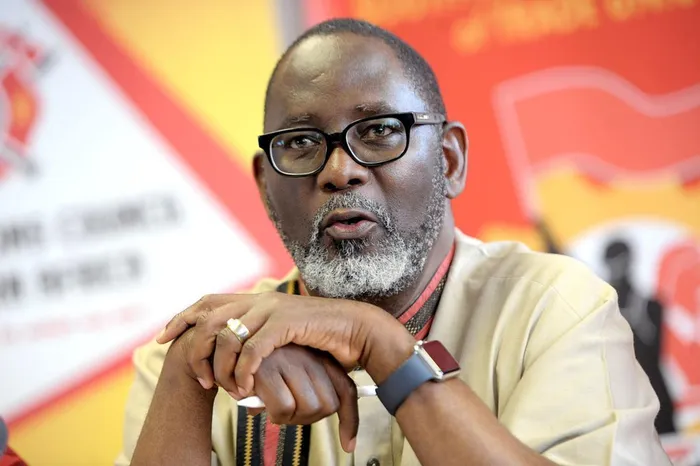Justice or diversion? Saftu challenges Ramaphosa's inquiry into TRC prosecutions

Justice buried under commissions is justice betrayed says SAFTU’s general secretary Zwelinzima Vavi, condemning President Ramaphosa’s new TRC inquiry as another diversion from real action and long-overdue accountability.
Image: File
The South African Federation of Trade Unions (Saftu) has criticised President Cyril Ramaphosa’s decision to establish a new commission of inquiry to investigate why the recommendations of the Truth and Reconciliation Commission (TRC) were never implemented.
Saftu views this move as a wasteful and cynical attempt to avoid accountability, branding it “a bizarre and shameful spectacle of the state appointing a commission to investigate itself for its failure to act on the findings of a previous commission.”
The announcement comes as Ramaphosa moves to establish a Judicial Commission of Inquiry to investigate whether government officials obstructed the investigation or prosecution of apartheid-era crimes.
These cases, referred by the TRC to the National Prosecuting Authority (NPA), have been a longstanding source of frustration for victims and their families.
Earlier this year, survivors and relatives of apartheid victims, with the backing of the Foundation for Human Rights (FHR), initiated legal proceedings in the Gauteng High Court. They accused senior state officials, including President Ramaphosa, Justice Minister Mmamoloko Kubayi, Police Minister Senzo Mchunu, National Prosecuting Authority head Shamila Batohi, and SAPS Commissioner Fannie Masemola, of unlawfully delaying and obstructing justice.
The Presidency on Wednesday, acknowledged that past administrations may have improperly influenced these investigations and stressed that the new inquiry follows extensive settlement discussions.
However, unresolved issues remain, such as the government’s potential liability for constitutional damages, which are now expected to be addressed through the commission’s terms of reference.
In a statement, Saftu's general secretary Zwelinzima Vavi, condemned what it called a recurring pattern of “governance by delegation and deferral — not by leadership.”
According to Saftu, the government’s response to major national crises has been to appoint commission after commission, yet few recommendations have been acted upon, and accountability remains elusive.
The statement highlights the lack of progress following the Zondo Commission into State Capture, where despite extensive revelations of corruption, “prosecutions are painfully slow, key enablers remain in office, and billions in stolen public funds have not been recovered.”
Saftu says the same failures are evident in the aftermath of the Marikana Commission, the Life Esidimeni Arbitration, and the Nugent Commission into SARS, each revealing systemic abuse or negligence, followed by minimal consequences.
Even the TRC, Saftu argues, has been betrayed.
“Three decades later, [its recommendations] have been ignored or shelved,” the federation says, adding that apartheid-era criminals who were denied or never sought amnesty remain unprosecuted, while victims and their families continue to suffer in silence.
“This endless cycle of commissions without consequences has become a deliberate strategy of avoidance,” the statement reads.
Vavi criticised Ramaphosa’s leadership style as weak and overly reliant on advisory structures that duplicate cabinet responsibilities.
“Instead of bold, decisive leadership, we have seen the emergence of a presidency that rules through endless committees, task teams, panels, and commissions,” he said.
“We have lost count of how many committees have been appointed, how many chairpersons and advisors are paid from the public purse, and how little actually gets implemented.”
Saftu also condemned specific presidential panels and advisory bodies such as the Presidential Advisory Panel on Land Reform and the Presidential Climate Commission, suggesting these structures are often redundant and ineffective. The federation warned that at this rate, future governments will merely establish more commissions to explain why past ones were ignored.
“We cannot escape the feeling that the Presidency may now be establishing a commission to find out why apartheid police assassin Eugene de Kock, the so-called Prime Evil, was not only pardoned, but provided a free house and protected, while his victims and their families roll in pain, still waiting for justice.
Saftu is demanding the immediate implementation of all TRC recommendations, a full accounting by the National Prosecuting Authority of unresolved TRC-related cases, and a national audit of all commissions and committees since 1994.
“South Africa does not suffer from a lack of truth. The truth has been told — again and again. What we suffer from is a lack of political will by a political elite that refuses to hold itself accountable,” the federation said.
In a call to action, Vavi urged, “We call on all progressive formations, justice organisations, and the people of South Africa to unite behind the call for real justice, not more commissions to cover up failure.”
“Justice delayed is justice denied. Justice buried under commissions is justice betrayed.”
hope.ntanzi@iol.co.za
Get your news on the go, click here to join the IOL News WhatsApp channel.
IOL Politics
Related Topics:
